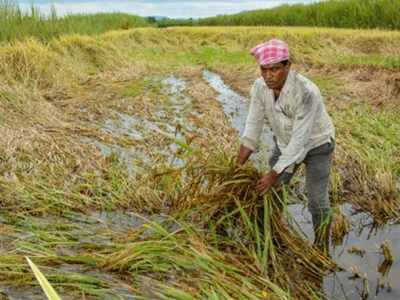Top Searches
- News
- India News
- Government hikes MSP of Kharif crops to boost farm income
Government hikes MSP of Kharif crops to boost farm income

Representative image
NEW DELHI: The Centre on Monday announced higher minimum support price (MSP) of 14 kharif (summer sown) crops for 2020-21, increasing the support price of most popular summer crop paddy from Rs 1,815 per quintal to Rs 1,868 per quintal.
The hike is, however, primarily tweaked in favour of coarse cereals (bajra and maize) and pulses (arhar and urad) in terms of percentage of return to farmers over their cost of production.
The move has been in sync with the Centre’s policy to encourage farmers to go for less water-consuming crops such as coarse cereals than the water-guzzling paddy. The focus on oilseeds is, on the other hand, aimed at reducing import bills as the country’s production doesn’t meet its demand.
Under new MSPs, the expected returns to farmers over their cost of production are estimated to be highest in case of bajra (83%), followed by urad (64%), tur (58%) and maize (53%). For the rest, return to farmers over their cost of production is estimated to be at least 50%.
The highest increase in new MSP in absolute terms compared to the 2019-20 support price is, however, for nigerseed (Rs 755 per quintal), followed by sesamum (Rs 370 per quintal), urad (Rs 300 per quintal) and cotton [long staple (Rs 275 per quintal)].
“This is in line with the 2018-19 Budget announcement of fixing MSPs at a level at least 1.5 times the all-India weighted average cost of production (CoP), aiming at reasonably fair remuneration for farmers,” said agriculture minister Narendra Singh Tomar.
The new MSPs were approved by the Union Cabinet. Besides, it also approved extension of repayment date for short-term loans for agriculture and allied activities under existing interest subsidy scheme from May 31 to August 31, keeping in view the Covid situation. The Centre had earlier extended this deadline from March 31 to May 31.
The hike is, however, primarily tweaked in favour of coarse cereals (bajra and maize) and pulses (arhar and urad) in terms of percentage of return to farmers over their cost of production.
The move has been in sync with the Centre’s policy to encourage farmers to go for less water-consuming crops such as coarse cereals than the water-guzzling paddy. The focus on oilseeds is, on the other hand, aimed at reducing import bills as the country’s production doesn’t meet its demand.
Under new MSPs, the expected returns to farmers over their cost of production are estimated to be highest in case of bajra (83%), followed by urad (64%), tur (58%) and maize (53%). For the rest, return to farmers over their cost of production is estimated to be at least 50%.
The highest increase in new MSP in absolute terms compared to the 2019-20 support price is, however, for nigerseed (Rs 755 per quintal), followed by sesamum (Rs 370 per quintal), urad (Rs 300 per quintal) and cotton [long staple (Rs 275 per quintal)].
“This is in line with the 2018-19 Budget announcement of fixing MSPs at a level at least 1.5 times the all-India weighted average cost of production (CoP), aiming at reasonably fair remuneration for farmers,” said agriculture minister Narendra Singh Tomar.
The new MSPs were approved by the Union Cabinet. Besides, it also approved extension of repayment date for short-term loans for agriculture and allied activities under existing interest subsidy scheme from May 31 to August 31, keeping in view the Covid situation. The Centre had earlier extended this deadline from March 31 to May 31.
FacebookTwitterLinkedinMail
Start a Conversation
end of article
Trending Topics
Quick Links
Coronavirus in MumbaiCoronavirus in KolkataCoronavirus in HyderabadCoronavirus in DelhiCoronavirus in BangaloreCoronavirus symptomsCoronavirus in IndiaWhat is CoronavirusCoronavirus NewsSolar EclipseNPRWhat is NRCCAB BillCAB and NRCRTI BillPodcast newsLok SabhaShiv SenaYSRCPCongressBJP newsUIDAIIndian ArmyISRO newsSupreme Court